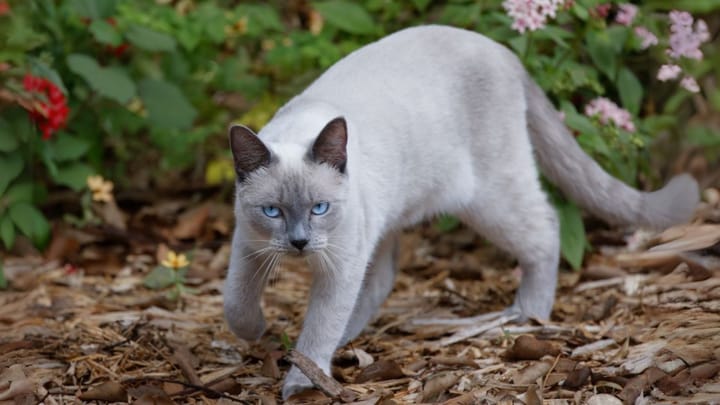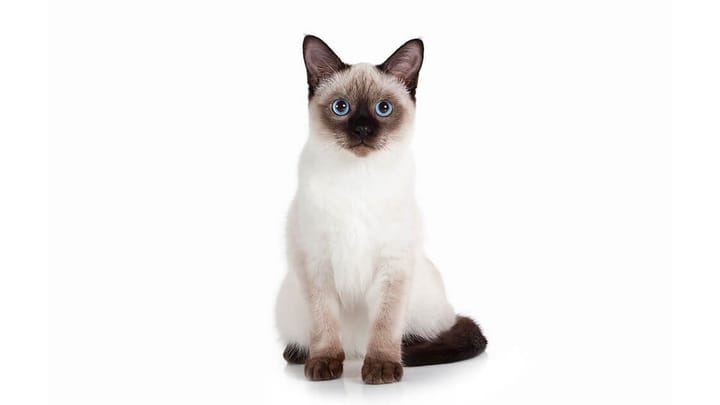Thaï
Other names : Wichien Maat, Traditional Siamese


The Thai cat is, as their name suggests, a native of Thailand. The breed is considered the ancestor of the Siamese, with a triangular head, a light body and dark extremities. Talkative, sensitive and very attached to their owners, they demand attention. Intelligent and docile, they’re very endearing and sweet. However, it is better to know how to deal with them so as not to become their slave!
|
Life expectancy |
The Thaï has a life expectancy of between 12 and 20 years |
|
Temperament |
|
|
Adult size |
Female
Between 12 and 14 in
Male
Between 12 and 14 in
|
|
Adult weight |
Female
Approximately 7 lb
Male
Between 9 and 11 lb
|
|
Coat colour
Blue point, chocolate point, lilac point, seal point |
Brown Blue |
|
Type of coat
Short |
Short |
|
Eye colour
Blue |
Blue
|
|
Purchase price |
The Thaï costs approximately 500£ |
Their original name, "Wichein-maat" means "Golden Diamond", or "Moon Diamond" in Thai. This shows just how much the breed was appreciated and treated with devotion. Most likely because Thai people thought that the "high-ranking" dead chose the body of a cat to reincarnate. These cats were present in the temples where they were treated with respect.
More details about the Thaï
Thaï: Origins and history
Various legends circulate about their origins and history. The oldest of them says that, on Noah’s ark, a monkey fell in love with a lioness and that of their union would be born the Thai cat, which would have the peculiarity to present the courage of the lioness and the agility of the monkey!
The Thai cat had a place in the Court of the King of Siam, former name of Thailand.
It is said that these cats were used to guard royal treasures and that they would eventually become cross-eyed from staring at the jewels for so long. This peculiarity is nowadays considered a defect, and these cats are excluded from competitions.
Another legend is linked to another of their physical peculiarities, the "break" in the tail. It seems that the Princesses of Siam used their tails to hold her rings. The weight of the jewels thus caused the "break" of the tail.
Be that as it may, it was in 1871 that the King of Siam offered to the Ambassador of England a couple of Thai cats, which is at the origin of their appearance in Europe.
They were bred selectively which gave rise to the breed of Siamese cat, with a finer silhouette than their ancestor.
Physical characteristics of the Thaï
The Thai is an averaged-sized cat, considered the "ancestor" of the Siamese, while being both stockier and more rounded. They have short and dense hair, light on the body and dark at the extremities (the colour darkens with the age). The head is very triangular in shape, with eyes as blue as possible and ears broad at their base and rounded at the tips. The dark colour can go as far as forming a mask on the face.
Thaï: Characteristics
Thaï: Behaviour
Breed compatibility Thaï
Thaï: Purchase price
On average, the price of a Thai kitten is approximately £500, the price often varies according to the breeder and the aesthetics of the cat. For the monthly budget, it will cost on average £25 / month to provide for their needs, by providing a quality diet and ensuring to their good health.
Thaï: Shedding
Light
During the moulting periods, shedding will be more significant than usual however it is rarely too extreme.
Thaï: Grooming
Their short fur is very easy to maintain. A weekly brushing and regular stroking will suffice to remove any dead hair.
Thaï: Health
On average, they live for 16 years but this varies significantly depending on the individual and lifestyles.
Given their short coat, they don’t like the cold and will stay indoors in the winter.
Their vivacity means they will lose weight faster than they gain it.
The Thai cat has no predisposition to particular illnesses, but of course they can succumb to the same illnesses as all other cats. If they can have access to the outdoors, it is better that they be vaccinated against infectious diseases such as Coryza, Leucose, Rage and Typhus, according to your vet’s opinion. On the other hand, it is important to verify their origins and to inform yourself about the quality of the breeder, because inbreeding can cause hereditary diseases, such as hydrocephalus (an increase in the size of the head due to too much brain fluid). Cases of retinal atrophy and heart failure are also known.
To maintain the breed, Thai cats can only be bred amongst themselves.
Moreover, because of their strong character, it is important that the period of socialization be long. During this period, the kitten will learn the rules of life, first from their mother and then from brothers and sisters. Any serious breeder will refuse to give you a Thai kitten that is less than 13 weeks old. It is in your best interest to accept this waiting time before bringing your kitten home, since the quality of your relationship for the following years is at stake.




